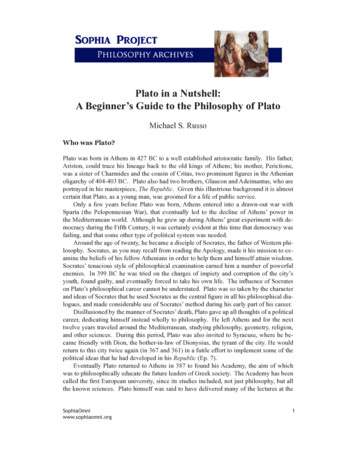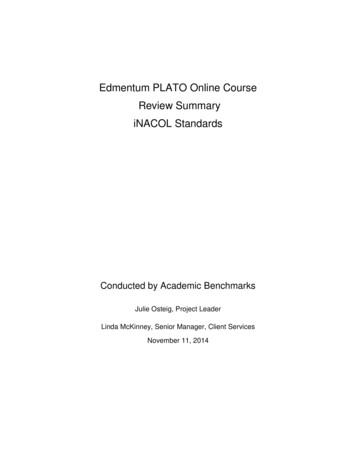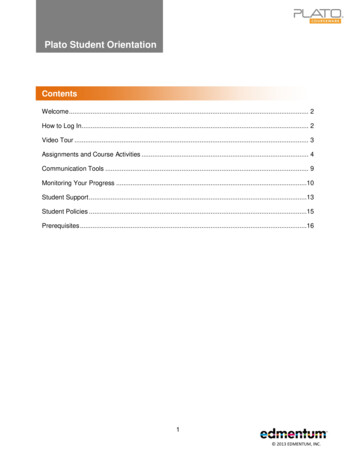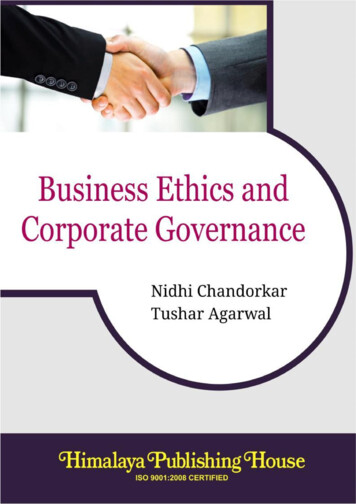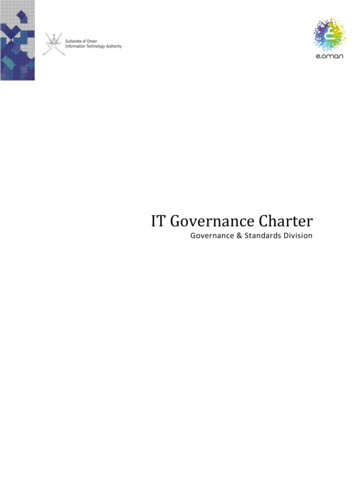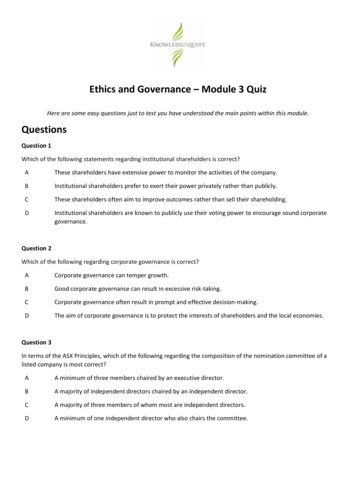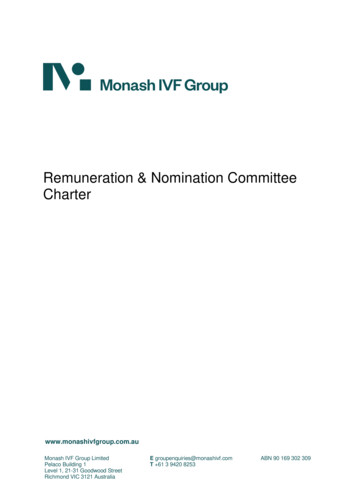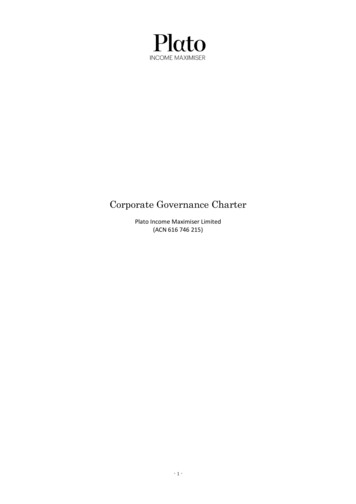
Transcription
Corporate Governance CharterPlato Income Maximiser Limited(ACN 616 746 215)-1-
DefinitionsAnnual General Meetingan annual general meeting of the CompanyASXASX Limited (ACN 008 624 691)ASX Recommendationsthe ASX Corporate Governance Council "Corporate Governance Principles andRecommendations” (as amended from time to time)Boardboard of DirectorsBoard Policypolicy of corporate governance in relation to the Board contained in section 1 of thisCharterChairpersonchairperson of the BoardCharterthis Corporate Governance charterCodethe Company’s code of conduct as set out in section 3 of this CharterCompanyPlato Income Maximiser Limited (ACN 616 746 215)Company Secretarysecretary of the CompanyConstitutionconstitution of the CompanyContinuous Disclosure Policythe Company’s continuous disclosure policy as set out in section 2 of this CharterCorporations ActCorporations Act 2001 (Cth)Directordirector of the CompanyExecutivea person involved in the strategic and operational management of the Company andincluding the Company Secretary and any service providers responsible for strategicor operational management but not including a DirectorInsider Trading Policythe Company’s insider trading policy as set out in section 5 of this CharterListing Rulesthe ASX Listing rules as amended from time to timeManagerPlato Investment Management Limited (ACN 120 730 136).Shareholderholder of shares in the CompanyShare Trading Policythe Company’s share trading policy as set out in section 4 of this CharterWebsitethe Company’s website is maintained at www.plato.com.au/lic-overview-2-
Plato Income Maximiser Limited(ACN 616 746 215)1.INTRODUCTIONCorporate governance is a set of systems, policies and procedures which define the way in which a company isgoverned. It establishes the objectives of a company ensuring that the administration and management of acompany is undertaken in a manner which is consistent with the interests of the company’s shareholders.Additionally, it establishes a system for monitoring and evaluating the achievement of those objectives.The ASX Recommendations define corporate governance as "the framework of rules, relationships, systemsand processes within and by which authority is exercised and controlled in corporations".Corporate governance policies will vary from company to company as there is no single system of corporategovernance that is applicable to all companies. A company must establish systems, processes and policies thathelp it achieve its objectives in light of the nature and size of that company.As a result, the Company has adopted a number of policies to ensure that it has high-quality and transparentsystems of corporate governance in place. These policies are incorporated in this Charter and are prepared inline with the ASX Recommendations which the Board recognises as best practice guidelines.The Charter incorporates the following:a.Board Policy – see section 1;b.Continuous Disclosure Policy - see section 2;c.Code of Conduct – see section 3;d.Share Trading Policy – see section 4; ande.Insider Trading Policy – see section 5.Board Policy1.2.INTRODUCTIONDirectors will be appointed and removed in accordance with the Corporations Act and the Constitution.The conduct of the Board is governed primarily by the Company’s Constitution. This policy aims to set out thepractices that the Company has established and to which the Board and each Director is committed. Thispolicy is simply an aid to the Board and the Directors. In the course of undertaking its responsibilities, theBoard at all times must act in a manner that is consistent with its duties and obligations as imposed by theCompany’s Constitution, the ASX Listing Rules and by the law. Should there be any inconsistency between thispolicy and the Constitution, the Constitution shall prevail.-3-
1.3.RESPONSIBILITIESThe Board is responsible for the overall operation, strategic direction, leadership and integrity of the Company,and in particular, is responsible for the Company’s growth and profitability. In meeting its responsibilities theBoard shall undertake the following functions:Strategic Directiona.Providing and implementing the Company’s strategic direction.b.Directing and monitoring the Company’s performance against strategies.Risk management and reportinga.Reviewing and overseeing the operation of systems of risk management ensuring that the significantrisks facing the Company are identified, that appropriate control, monitoring and reporting mechanismsare in place and that risk is appropriately dealt with.b. Monitoring and appraising financial performance including the approval of annual and half year financialreports and liaising with the Company’s auditors.c.Liaising with the Manager to identify and manage risk.d.An appointed service provider will be responsible for preparing the declaration pursuant to section295A of the Corporations Act as the Company does not have a chief executive officer (or equivalent) ora chief financial officer (or equivalent). Accordingly, the Board will require that the Manager puts inplace sound systems of risk management and internal controls and ensures that the systems andcontrols are operating effectively in all material respects in relation to financial reporting risks.Managementa.Monitoring and assessing the performance of the Manager and ensuring that its actions are consistentwith corporate strategy.b.Ensuring that appropriate and effective remuneration packages and policies are implemented by theCompany.c.Monitoring and reviewing business results, outsourced service providers and the Board itself.d.Ensuring the Board is comprised of individuals who are best able to discharge the responsibilities ofDirectors having regard to the law and the best standards of governance.Remunerationa.Ensuring appropriate remuneration policies and practices are in place for Directors, while having regardto the guidelines issued by ASX in this regard, noting that the Company does not have executivedirectors or other senior management.b.The allocation and amount of remuneration for Directors will be reviewed every twelve months and willreflect market rates.Performancea.Formation and monitoring of corporate governance policies, codes of conduct and committees-4-
b.Undertaking an annual performance evaluation of the Board in light of this Charter.c.Reviewing and overseeing internal compliance and legal regulatory compliance.Corporate governancea.Ensuring compliance with the Company’s Constitution and with the continuous disclosure requirementsof the ASX Listing Rules and the Corporations Act.b.Communicating with, and protecting the rights and interests of, all Shareholders.1.4.BOARD COMPOSITIONThe composition of the Board is determined as follows:a.The Company’s Board shall comprise of a minimum of three Directors, two of which will be Australianresidents.b.The Board must be comprised of members with expertise, experience and skills relevant to the businessof the Company.c.The Board will determine the number of independent Directors it considers appropriate based on thesize, nature and complexity of the business at any given time.1.5.COMPANY SECRETARYThe Company Secretary is directly accountable to the Board, through the Chairperson, on all matters to dowith the proper functioning of the Board.1.6.INDEPENDENCEThe ASX Recommendations establish a number of factors that may be considered when assessing theindependence of Directors. The factors are whether a Director:a.is a substantial shareholder of the Company or an officer of, or otherwise associated directly with, asubstantial shareholder of the Company;b.is employed, or has previously been employed in an executive capacity by the Company or anotherCompany member, and there has not been a period of at least three years between ceasing suchemployment and serving on the Board;c.has within the last three years been a principal of a material professional advisor or a materialconsultant to the Company or another Company member, or an employee materially associated with aservice provider;d.is a material supplier or customer of the Company or other Company member, or an officer orotherwise associated directly or indirectly with a material supplier or customer;e.has a material contractual relationship with the Company or another Company member other than as aDirector.These factors are only indicators of matters in which to assess the independence of a Director. The Board willassess the independence of each Director in light of the interests disclosed by them. The Board’s assessment-5-
of the independence of Directors will be disclosed in the Company’s future annual reports (to the extentdeemed necessary).1.7.COMMITTEESThe Company recognises the importance of establishing audit, risk management, remuneration andnomination committees as good corporate governance in circumstances where appropriate for the size, natureand complexity of the Company.Considering the size of the Company, the functions that would be performed by an audit and risk committeeand remuneration and nomination committee are best undertaken by the Board at this time.The Board will review its view on these committees in line with the ASX Recommendations and in the contextof any changes to the size or nature of the Company and if required may establish committees to assist it incarrying out its functions. At that time the Board will adopt a policy or charter for such committees inaccordance with the ASX Recommendations and industry best practices.1.8.APPOINTMENT AND RETIREMENTAppointmentThe Board will consider the appointment of a Director as and when a vacancy arises in accordance with thefollowing considerations:a.the skills, expertise and experience of any proposed Director;b.the relevance and appropriateness of these skills, expertise and experience when compared to those ofthe current Board;c.diversity of the Board;d.the results of any background check which the Board undertakes;e.the terms of appointment must be in accordance with the Constitution, Corporations Act and ListingRules; andf.the terms of appointment must be recorded in a letter of appointment taking into consideration theASX Recommendations, and if appointed this will form the basis of the written agreement between theCompany and the Director.The Board will provide shareholders with all material information in its possession relevant to a decision onwhether or not to elect or re-elect a Director.Prior to making any formal offer, a potential Director must be given sufficient information about the Companyto allow the potential Director to conduct his / her personal due diligence. The information will extend to nonpublic information and care must be taken to ensure confidentiality.RetirementA Director must retire in accordance with the Corporations Act, the Listing Rules and the Company’sConstitution. A Director may be re-elected if the Constitution permits. The Board will institute successionplanning for Directors and the Chairperson to ensure a prompt suitable replacement in the case of a vacancy.-6-
1.9.INDUCTION AND INFORMATIONInduction ProgramThe Company Secretary is responsible for arranging for the new Director to undertake an induction program toenable them to gain an understanding of:a.the Company’s investments;b.the Company’s financial, strategic, operational and risk management position;c.their rights, duties and responsibilities; andd.any other relevant information.As part of this induction program, a new Director will meet with all incumbent Directors (if this has not alreadytaken place).Ongoing InformationThe Directors and Executives must be conscious to ensure that updated information is provided to the Board ina timely fashion to enable the Directors to effectively discharge their duties as Directors.Directors are entitled to request and receive such additional information as they consider necessary to supportinformed decision-making. Any Director has the authority to seek any information he/she requires from anyExecutive of the Company.Directors are entitled to receive appropriate professional development opportunities and maintain the skillsand knowledge needed to perform their role as Director effectively. The Board will consider what isappropriate in this regard and the costs of such professional development must be reasonable whenconsidered against the Company’s corporate strategy and business plan.1.10. ADVICE, SHARE TRADING AND PERFORMANCEIndependent AdviceIn the performance of their duties as Directors, the Directors have a right to seek independent legal or otherprofessional advice at the Company’s expense.Director Share TradingThe Share Trading Policy imposes restrictions on the trading of the Company’s shares by people, includingDirectors with undisclosed price sensitive information. All Directors and Executives must follow the ShareTrading Policy.PerformanceDue to the current size of the Company and its level of activity, the Board is responsible for the evaluation ofits performance and the performance of individual Directors and the Executives. This internal review is to beconducted on an annual basis and if deemed necessary this internal review will be facilitated by anindependent third party. To determine whether it is functioning effectively, the Board shall:a.review this policy annually; andb.perform an evaluation of the Board’s performance at intervals considered appropriate.-7-
1.11. ETHICAL STANDARDS AND SHARE TRADINGThe Directors must perform their duties in line with the Company’s objectives and with the utmost integrity.Furthermore, the Directors must comply with the Company’s Code of Conduct, Share Trading Policy andInsider Trading Policy as set out in sections 3, 4 and 5 of this Charter.1.12. COMPLIANCE WITH LAWSThe Company must comply with the Corporations Act, the Listing Rules as well as all other applicable laws,statutes and policies.1.13. CONSTITUTIONThe Constitution is a key governance document. The Board must ensure that it complies at all times with theprovisions of the Constitution.2.CONTINUOUS DISCLOSURE POLICY2.1.INTRODUCTIONThe objective of the Continuous Disclosure Policy is to ensure that the Company complies with its continuousdisclosure obligations under the Corporations Act and the Listing Rules. Additionally, this policy aims to:a.ensure that information issued by the Company is issued to Shareholders and the market in a timelymanner;b.to promote investor confidence in the integrity of the Company and its securities; andc.to generally promote investor protection and protection of the market.2.2.CONTINUOUS DISCLOSUREAn ASX listed company is subject to the continuous disclosure requirements under the Corporations Act andthe Listing Rules, in addition to the periodic and specific disclosure requirements in the Listing Rules.The continuous disclosure obligation is contained in Listing Rule 3.1 and states that the continuous disclosureobligation will be breached by an issuer who intentionally, recklessly or negligently fails to notify ASX ofinformation that:a.is not generally available; andb.a reasonable person would expect, if it were generally available, to have a material effect on the priceor value of its securities.Contravention of continuous disclosure obligations can extend to a person (Director or Executive) who isinvolved in a contravention of the continuous disclosure regime by a disclosing entity.2.3.DISCLOSURE EXCEPTIONThe continuous disclosure obligation is not applicable where:-8-
a. a reasonable person would not expect the information to be disclosed;b. the information is confidential and ASX has not formed the view that the information has ceased to beconfidential; andc.one or more of the following applies:i.it would be a breach of a law to disclose the information;ii.the information concerns an incomplete proposal or negotiation;iii.the information comprises matter of supposition or is insufficiently definite to warrantdisclosure;iv.the information is generated for internal management purposes of the Company; orv.the information is a trade secret.To rely on the exception, the above three requirements must be satisfied. Should one of the exceptions nolonger be applicable then the Company can no longer rely on these exceptions and must disclose theinformation immediately to the market.2.4.COMPLIANCEThe Company will ensure compliance with this Continuous Disclosure Policy and will:a.disclose price sensitive information to ASX as soon as it becomes aware of that information;b.ensure that the information is not false, misleading or deceptive so as to avoid creating what wouldconstitute a false market; andc.ensure that the information is disclosed clearly (expressed objectively), accurately and is complete.In doing so the Company will ensure compliance with Listing Rule 15.7 that requires an entity not to releaseinformation to any person until it has given the information to ASX and has received an acknowledgementfrom ASX that the information has been released to the market.2.5.PRICE SENSITIVE INFORMATIONThe Company will ensure that all price sensitive information is released to the market in accordance with theListing Rules and in accordance with the announcements procedure in section 2.9 of this policy.Price sensitive information is information that:a.a reasonable person would expect will have “a material effect on the value or price” of securities; andb. if the information were publicly available “would, or would be likely to, influence persons whocommonly invest in securities in deciding whether to acquire or dispose of those securities”.Price sensitive information includes information relating to a takeover bid or a merger, proposed acquisition ordisposal of a material asset, material variations in earnings or profits from previously published forecasts, amaterial change to the business plan, loss of a material contract and major litigation.-9-
2.6.LOSS OF CONFIDENTIALITYWhere confidentiality is lost as a result of a specific rumour or media comment then the Company will respondto media speculations to the extent that such responses are required to correct or prevent a false market. Indetermining whether confidentiality is lost the Company will look at previous announcements it had made andwill consider any likely reaction of the market or particular investors to such speculation.2.7.ADMINISTERING CORPORATE GOVERNANCE COMPLIANCEThis policy will be administered as follows:a.the Board will be involved in reviewing significant ASX announcements and ensuring and monitoringcompliance with this policy; andb.The Manager will report any material price sensitive information to the Company Secretary and willobserve the Company’s “no comments” policy as set out in section 2.10 below.2.8.COMPANY SECRETARYThe Company Secretary is responsible for the overall administration of this policy, particularly:a.ensuring that the Company is compliant with its disclosure obligations;b.communicating with ASX;c.reviewing proposed announcements and consulting with the Board and other advisors as necessary;d.implementing reporting processes for materiality of information;e.reporting on continuous disclosure issues regularly to the Board;f.keeping a record of ASX announcements;g.monitoring and reporting to the Board on the effectiveness of this Continuous Disclosure Policy in lightof the ASX Recommendations; andh.regularly reviewing the Continuous Disclosure Policy in light of legislative changes or otherdevelopments.2.9.ANNOUNCEMENTS PROCEDUREThe Company’s announcements to ASX will be managed in accordance with the following procedure:a.as soon as a Director becomes aware of any price sensitive information the Board or the CompanySecretary is to be notified;b.the Company Secretary will review and assess that information and determine whether it needs to bedisclosed or whether it needs to be further discussed with the Board;c.if an announcement of price sensitive information is required the Company Secretary will prepare adraft announcement;d.the Company Secretary will provide the draft announcement to the Board for approval;- 10 -
e.following the approval of an announcement of price sensitive information by the Board, the CompanySecretary will then lodge the announcement with the ASX electronically; andf.after receiving acknowledgement from the ASX that the announcement has been released theCompany Secretary will ensure the announcement is accessible from the Website. This will be donewithin 24 hours of receiving that acknowledgement.2.10. NO COMMENTS POLICYThe Company has adopted a “no comments” policy in relation to any market speculation or rumours and thispolicy must be observed by all Directors and Executives at all times. In light of this, the Company may issue anannouncement in response to a market speculation or rumour where it is necessary to do so to eliminate thepossibility of a false market or contravention of the Listing Rules.Where a Director or Executive is approached by the media or any analysts or other external parties withrespect to providing any information about the Company, the general policy to be observed is a “nocomments” policy and that person will notify the Company Secretary as soon as possible.As part of the Company’s management of investor relations it may conduct briefings with analysts or investorsfrom time to time. However, the Company’s policy for conducting these briefings will be to ensure that nomaterial price sensitive information is announced prior to it being announced to the market. No briefing willbe held during the pre-results periods.See the Insider Trading Policy in section 5 for further details.2.11. RESPONDING TO ANALYST REPORTS AND FORECASTSIf a draft report has been sent to the Company for comments the report should be forwarded directly to theCompany Secretary. The Company will not endorse any reports, and will restrict any comments to factualmatters and matters which have been previously disclosed to the ASX. See the Insider Trading Policy in section5 for further details.2.12. TRADING HALTSThe Company in certain circumstances may need to request a trading halt from the ASX. The Chairperson inconsultation with the Board will make decisions in relation to trading halts and the only personnel authorisedto request a trading halt on behalf of the Company will be the Chairperson and the Company Secretary.2.13. ADVISORSTo ensure compliance with its listing obligations, the Company may from time to time require advisors toadvice on its adherence to this policy. The Company may ask such advisors to sign a confidentiality agreementbefore disclosing any information to them.2.14. CONTRAVENTION OF POLICYNon-compliance with the continuous disclosure obligations may constitute a breach of the Corporations Actand the Listing Rules. This may result in fines for the Company, personal liabilities for Directors and otherofficers and damage to the Company’s reputation. The Company takes continuous disclosure very seriouslyand will not tolerate any deviation from this policy by any person and will take disciplinary action where acontravention arises. Disciplinary action may include dismissal.- 11 -
2.15.SHAREHOLDER COMMUNICATIONSThe Board aims to keep Shareholders informed of all major developments affecting the Company's activitiesand its state of affairs through announcements to the ASX, releases to the media and dispatch of financialreports. All such announcements are also placed on the Company’s Website.These include:a.monthly net tangible asset backing announcements;b.the half year report;c.the annual report;d.the notice of Annual General Meeting, explanatory memorandum and the Chairperson’s address;e.ASX announcements made to comply with the Company’s continuous disclosure requirements; andf.occasional correspondence sent to Shareholders on matters of significance to the Company.The Board encourages full participation of Shareholders at the Annual General Meeting or any general meetingof the Company to ensure a high level of accountability and identification with the Company’s strategy andgoals. The Company’s external auditor will attend the Annual General Meeting to answer questions fromShareholders relating to the audit.The Company’s annual report is the main vehicle for communicating with Shareholders on the activities andperformance of the Company in the previous 12 months. The annual report will be posted on the Company’sWebsite and will be downloadable.The Company will also provide Shareholders with the option to receive communications from, and sendcommunications to, the Company and its share registry electronically.2.16. ETHICAL STANDARDS/BUSINESS CONDUCTThe Company actively promotes a set of values designed to assist all personnel in their dealings with eachother, competitors, customers and the community. The Company has adopted a Code of Conduct policy andShare Trading Policy which are set out in sections 3 and 4 of this Charter.3.CODE OF CONDUCT3.1.INTRODUCTIONThe Company is committed to maintaining ethical standards in the conduct of its business activities. TheCompany’s reputation as an ethical business organisation is important to its ongoing success and it expects allits Directors and Executives to be familiar and have a personal commitment to meeting these standards.3.2.PURPOSE OF THE CODE- 12 -
The Board has adopted this Code of Conduct to define basic principles of business conduct. This Code requiresDirectors and Executives to abide by the policies of the Company and to the law. The Code is a set ofprinciples giving direction and reflecting the Company’s approach to business conduct and is not a prescriptivelist of rules for business behaviour.3.3.BUSINESS ETHICSOpenness, honesty, fairness and integrityDirectors and Executives will conduct themselves with openness, honesty, fairness and integrity in businesstransactions and in dealings with others.Mutual respectDirectors and Executives are expected to treat everyone else with whom they interact in their work withcourtesy and respect.Ethical ConductDirectors and Executives will act ethically in their approach to business decisions.Compliance with LawsDirectors and Executives are expected to comply with all laws that govern the Company’s business and thepolicies that the Company adopts from time to time.3.4.BUSINESS CONDUCTDirectors and Executives will observe appropriate principles of behaviour when conducting Company businessand interacting with others, including:Compliance with laws and regulationsDirectors and Executives will act in compliance with all laws that apply to the Company’s business. Directorsand Executives will need to obtain the consent of the Company Secretary or Chairperson to seek advice fromone of the Company’s legal advisors if they are unclear about any laws relating to their work.Trading in SharesAny trading of the Company’s shares must be done in accordance with the Share Trading Policy.Privacy and Intellectual propertyEach Director and Executive is responsible for protecting the Company’s intellectual property rights. Allintellectual property that is generated in relation to the Company is the property of the Company.3.5.PERSONAL AND PROFESSIONAL CONDUCTFinancial IntegrityThe Company has stringent financial accounting procedures that are overseen by the Board and the externalauditor. The use of Company funds or assets for any unethical purpose is prohibited.- 13 -
ConfidentialityDirectors and Executives may not at any time, directly or indirectly, profit from confidential informationobtained during the course of duties they perform on behalf of the Company.Each Director and Executive must safeguard confidential information of the Company by not transferring,publishing, using or disclosing it other than when necessary in the ordinary course of business, or asspecifically directed or authorised. All confidential or proprietary information that has been entrusted to theCompany by a third party must be treated as if it was the Company’s confidential information.Public StatementsPublic statements have the potential to breach the Company’s obligations in respect to confidentialinformation, share trading and continuous disclosure.Directors and Executives should not make public statements unless authorised by the Chairperson or CompanySecretary.Gathering information on the Company’s competitorsInformation should not be gained through unlawful or deceitful means.Conflict of InterestAll Directors and Executives have an obligation to seek to avoid financial, business or other relationships whichmight be opposed to the interests of the Company or which may conflict with the performance of their duties.Where a conflict arises, the Director or Executive should notify the Company Secretary in writing, who shallinform the Board of the conflict as soon as practicable. The notice should detail the nature and extent of thepotential conflict. Where a Director or Executive has any doubt about conflicts of interest, the Director orExecutive should contact the Company Secretary.A Director must give the other Directors notice if they have an interest in matters that relate to the Company’saffairs that may give rise to a conflict. The disclosure must detail the nature and extent of the interest, berecorded in the minutes of the Directors’ meetings and referred to the Chairperson for determination.3.6.IMPROPER BEHAVIOURDirectors and Executives are encouraged to contact the Company Secretary where the Director or Executivehas a reason to suspect that any fraudulent or unethical behaviour has occurred.3.7.MORE INFORMATIONAny Director or Executive requiring further information regarding any aspect of the Code must contact theCompany Secretary.- 14 -
4.SHARE TRADING POLICY4.1.POLICYThe Board has established the following policy to apply to trading in the Company’s shares on ASX. This policyapplies to those persons defined below as “Restricted Persons” of the Compa
Ensuring that appropriate and effective remuneration packages and policies are implemented by the Company. c. Monitoring and reviewing business results, outsourced service providers and the Board itself. d. Ensuring the Board is comprised of individuals who are best able to discharge the responsibilities of Directors having regard to the law and the best standards of governance. Remuneration a .

